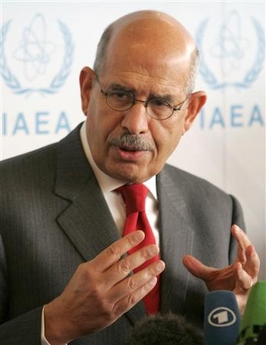|
Atom agency seen reporting Iran to Security Council
(Reuters)
Updated: 2006-02-03 09:44
Driven by rare consensus between Western powers and Russia and China, the
U.N. nuclear watchdog looked set on Friday to report Iran to the U.N. Security
Council over fears it may be after atomic bombs, Western diplomats said.

IAEA Director
General Mohamed El Baradei briefs the media during a board of governors
meeting in Vienna's U.N. headquarters, February 2, 2006.
[Reuters] |
|
Moscow and Beijing endorsed an EU-sponsored resolution to put the Council on
notice about Iran so long as Tehran was given a reprieve at least until March to
cooperate fully with U.N. probes before action, possibly including sanctions,
could ensue.
Thursday's opening session of the International Atomic Energy Agency's (IAEA)
35-nation board adjourned after a few hours for backdoor negotiations which EU
leaders hoped would yield the maximum number of "yes" votes possible.
Analysts reckoned that after the board reconvenes at 9 a.m. EST on Friday, a
majority of 25 to 30 will approve the resolution.
"On paper, we should be able to go for adoption of the resolution later on
Friday. We are aiming for a wide board consensus thanks to the strong P-5
message," said an EU diplomat, referring to the Security Council quintet.
But if reported, Iran has threatened to lash back by halting U.N. spot checks
of its atomic sites as part of a world treaty to deter clandestine nuclear
bomb-making. Tehran has also warned it would pursue "industrial-scale"
enrichment of uranium fuel.
Developing nations, querying the push to single out Iran when the IAEA has
said it has found no hard proof of a bomb program, were negotiating for less
pro-active resolution text, diplomats said.
A FEW 'NO' VOTES, ABSTENTIONS SEEN
But "no" votes looked likely only from U.S. adversaries Venezuela, Syria and
Cuba while it was possible India, South Africa and Indonesia would abstain to
signal they did not want their right to nuclear technology potentially
restricted.
Iran, whose president has called for Israel to be "wiped off the map," says
it wants nuclear energy for electricity, not bombs as the West suspects, and the
bid to report it to the Security Council has no legal basis.
But Iran hid nuclear activities from the IAEA for 18 years until 2003. In
September, the IAEA declared Iran non-compliant with commitments as a party to
the nuclear Non-Proliferation Treaty, but put off referring Tehran to the
Security Council.
IAEA chief Mohamed ElBaradei said the special meeting was to prod Iran to
resolve years of suspicion about its nuclear goals before he makes a sweeping
report to the next regular session of the Vienna-based board on March 6.
|